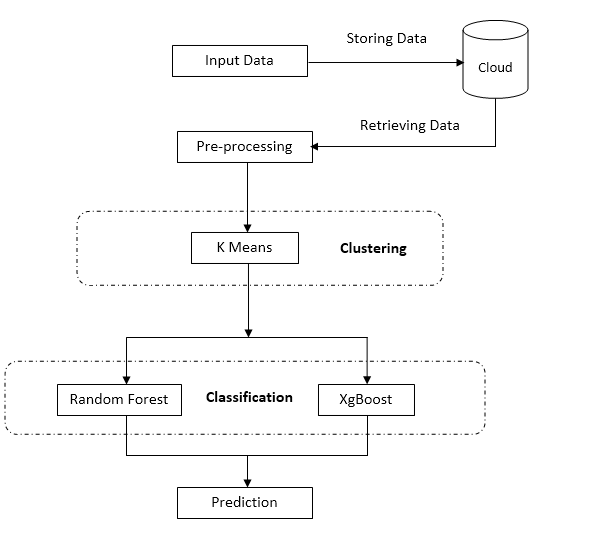Advanced Prediction of Performance of a Student in an University using ML Techniques
Objective
The main objective of this project is to detect the performance of the student in the university exams using the machine learning techniques.
Abstract
Predicting academic performance is an important task for the students in university, college, and school, etc. Machine Learning is a field of computer science that makes the computer to learn itself without any help of external programs. The dataset used in this project is stored in a cloud server and accessed using queries as and when required. There are two approaches for machine learning techniques one is supervised learning and the other one is unsupervised learning. In unsupervised learning, K-means clustering are being used and in supervised, ensemble techniques like Random Forest and XGBoost algorithm are implemented. Nowadays evaluating the student performance of any organization is going to play a vital role to train the students. All of the above algorithms were combined and used for student evaluation and a possible suggestion to the student is provided to improve their career.
KEYWORDS: Performance, Machine Learning, Supervised and Unsupervised learning, K Means, Random Forest, XgBoost.
NOTE: Without the concern of our team, please don't submit to the college. This Abstract varies based on student requirements.
Block Diagram

Specifications
HARDWARE SPECIFICATIONS:
- Processor: I3/Intel
- Processor RAM: 4GB (min)
- Hard Disk: 128 GB+
- Key Board: Standard Windows Keyboard
- Mouse: Two or Three Button Mouse
- Monitor: Any
SOFTWARE SPECIFICATIONS:
- Operating System: Windows 7+
- Server-side Script: Python 3.6
- IDE: PyCharm
- Libraries Used: Pandas, Numpy, Sci-Kit Learn, Matplotlib, Seaborn, Flask, Pickle.
- Framework: Flask.
Learning Outcomes
- Importance of Supervised Learning.
- Importance of Unsupervised Learning.
- Scope of student performance prediction.
- How to use classification and clustering together in a model.
- Learning about PyCharm IDE.
- Use of Bayes Theorem.
- Use of Conditional Probabilities.
- Benefits of Tree based classifications.
- Importance of Cross validation.
- Use of HTML5 and CSS in UI designing.
- How to run and deploy the application.
- Process of debugging a code.
- Input and Output modules
- How test the project based on user inputs and observe the output
- Project Development Skills:
- Problem analyzing skills.
- Problem solving skills.
- Creativity and imaginary skills.
- Programming skills.
- Deployment.
- Testing skills.
- Debugging skills.
- Project presentation skills.
- Thesis writing skills.





 Paper Publishing
Paper Publishing
